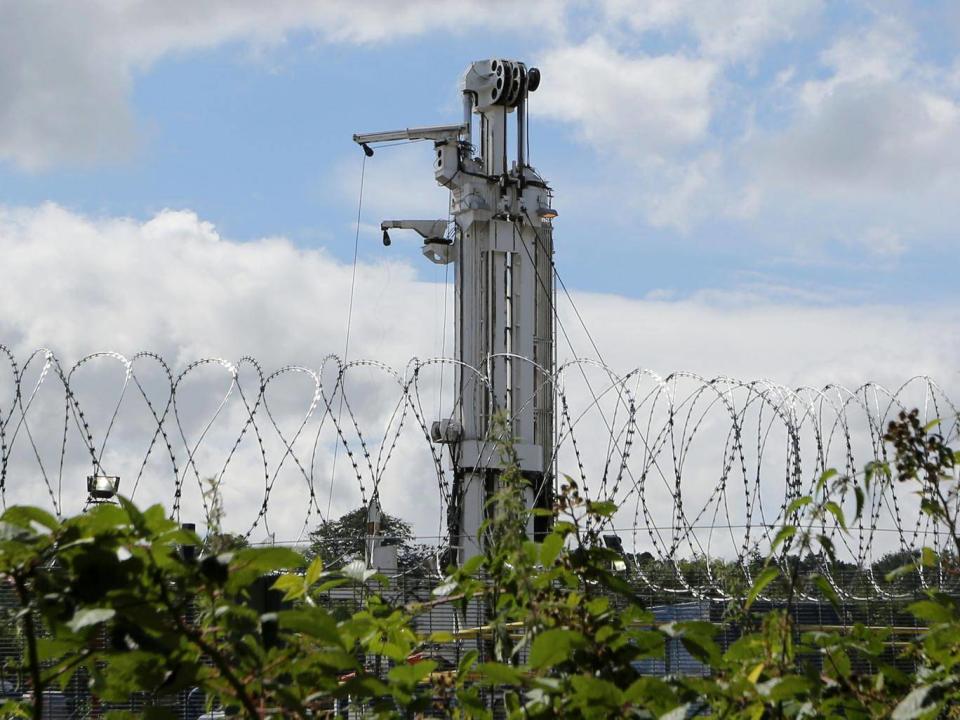More than 6,000 fracking wells needed in UK to halve gas imports, study says

The UK would have to build 6,100 wells to replace just 50 per cent of gas imports between 2021 and 2035, a new study has found, casting doubt on Conservative calls a US-style fracking “revolution” in the UK at the last general election.
The party claimed it would push down gas prices for consumers and make Britain less reliant on imports from countries including Russia.
But a new study by Cardiff Business School has found that one well would have to be drilled and fracked every day for 15 years for half of gas imports to be replaced
And if the quantities of gas produced per well was at the lower end of the amount forecast, the report suggests the number of wells required could rise to as many as 16,500 in total.
Drilling 6,100 wells would require more than 1,000 separate well pads for drilling equipment each covering 3.5 hectares. Each well pad requires access roads and facilities such as mobile portacabins for offices.
The amount of space is equivalent to around 4,900 football pitches, according to Friends of the Earth, which commissioned the study.
Rose Dickinson, from the organisation said: “This would mean an industrialisation of our countryside at a rate that nobody has yet fully appreciated and would put many more communities in the firing line of this dirty and unwanted industry.”
Fracking has been banned or suspended in Scotland, Wales and Northern Ireland, leaving England as the only country where it remains an option.

In addition, the Labour Party, Liberal Democrats and the Greens are all opposed to the practice, which involves pumping water and chemicals deep underground to fracture shale rock to access gas reserves.
The Conservatives’ 2017 manifesto said: “The discovery and extraction of shale gas in the United States has been a revolution. Gas prices have fallen, driving growth in the American economy and pushing down prices for consumers.
"The US has become less reliant on imported foreign energy and is more secure as a result. We will therefore develop the shale industry in Britain.”
When he was mayor of London Boris Johnson was a particularly vocal supporter of fracking in Britain.
The foreign secretary wrote that the UK was “increasingly and humiliatingly dependent on Vladimir Putin’s gas or on the atomic power of the French state,” and calling for the UK to “get fracking right away”.
Britain imports 59.8 per cent of all the gas we use. Of that figure, around 1 per cent now comes from Russia.
Norway is the principal source of UK gas imports, at 75 per cent, up from 65 per cent in 2016, according to government figures.
Meanwhile, over the past six years the UK’s renewable electricity output has leapt from providing 9 per cent to almost 30 per cent of UK electricity, recent government figures reveal.
Daniel Carey-Dawes, senior infrastructure campaigner at the Campaign to Protect Rural England, said: "The fracking industry has always been clear that fracked gas would replace what's currently imported, but what wasn't clear was the scale of land take that would involve.
"The many thousands of wells that would be needed, peppered across our precious landscapes, would cause harm to the English countryside on an industrial scale."
The report concludes that “there is no evidence that fracked gas can be brought to market at sufficiently low cost, and sufficiently great volume to make any significant profit, or to make any difference to the UK energy security position.”
A Department for Business, Energy & Industrial Strategy spokesperson told The Independent: “The UK Government is committed to ensuring we have secure energy supplies that are reliable, affordable and clean. As part of this, shale gas has the potential to be a home-grown energy source which can lead to jobs and economic growth, contribute to our security of supply, and help us achieve our climate change objectives.
“We have been clear that shale development in the UK must be safe and environmentally sound and we have a strong regulatory system in place.”

 Yahoo Finance
Yahoo Finance 